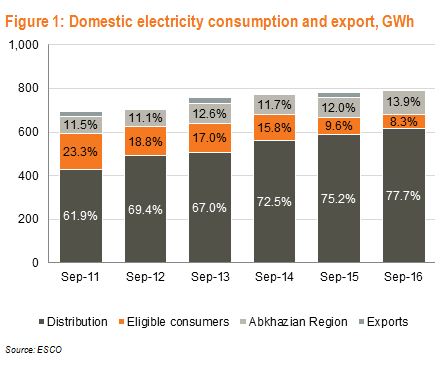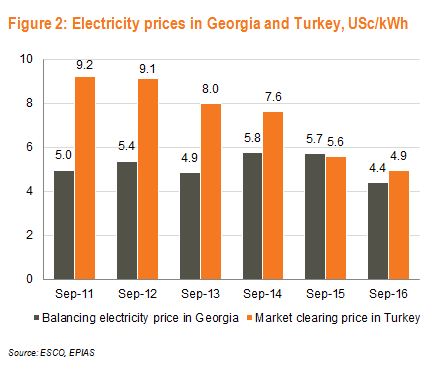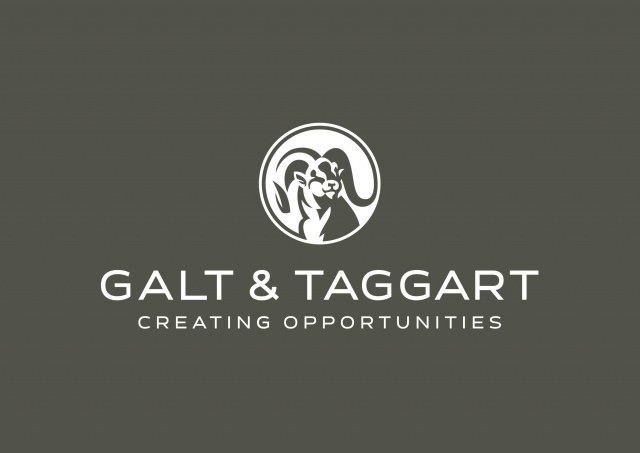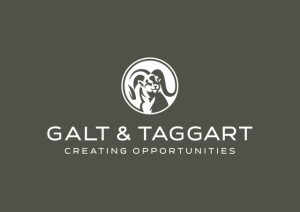Electricity Market Watch
Sector research is one of the key directions of Galt & Taggart Research. We currently provide coverage of the Energy, Healthcare, Tourism, Agriculture, Wine, and Real Estate sectors in Georgia. As part of our energy sector coverage, we produce a monthly Electricity Market Watch, adapted here for Georgia Today’s readers. Previous reports on the sector can be found on Galt & Taggart’s website - gtresearch.ge.
Georgia’s full membership to European Energy Community approved
On October 14, 2016, the Energy Community (EnC) Ministerial Council unanimously approved the accession of Georgia to the EnC treaty at its meeting in Sarajevo. Georgia is expected to join as a full-fledged member in the course of 2017, following the ratification of the accession agreement by the Georgian Parliament. Accession to the EnC will require Georgia to take on obligations set out in the accession protocol, with implementation deadlines set for the beginning of 2020. Implementation of regulations is expected to result in a transparent and competitive electricity market, with higher standards of customer service. Ancillary service market development is also on the agenda. One of the most important legal reforms that the Ministry of Energy will have to undertake is the effective unbundling of generation and supply, provided that the interests of the shareholders of vertically integrated undertakings are defended in the process. There is also a separate provision on the importance of cost-reflective tariffs.
Guaranteed capacity fee for Gardabani CCPP to be revised for 2017
The guaranteed capacity (GC) fee for Gardabani CCPP for 2017 is to be determined. The regulator will commence the relevant proceedings on October 27, 2016 and finalize the decree by December 31, 2016. GNERC sets the GC fee based on the methodology adopted in 2014. The daily fee is determined by dividing the sum of fixed OPEX and CAPEX for the tariff year by the number of days the guaranteed source will be on stand-by. The maximum number of days on stand-by is indicated in a decree issued by GNERC.
Danish consultants to advise Georgia on energy efficiency and renewable energy integration
A Danish consultancy, Niras, is consulting the Georgian government on matters of energy efficiency and sustainable energy. The project is financed by the Ministry of Foreign Affairs of Denmark and encompasses assistance in developing energy efficiency monitoring methodology and regulations on integration of renewable resources into the grid.
Tbilisi and the Abkhazian region driving electricity consumption growth
Domestic consumption increased 4.3% y/y in September 2016, with Tbilisi and the Abkhazian region driving the growth. DNO consumption was up 4.5% y/y, with the greater Tbilisi area (Telasi subscribers) posting a 16.8% y/y growth rate. Usage of Energo-Pro subscribers was down 1.3% y/y, while Kakheti Energy Distribution usage was up 2.0% y/y. Consumption of eligible consumers was the main drag on growth, down 12.9% y/y from an already very low base in September 2015. Georgian Manganese drove the decline in direct consumption, down 10.8% y/y from the September 2015 low base. Consumption of the Abkhazian region was up 17.3% y/y, following a 12.9% y/y increase in August 2016. Electricity exports were negligible. A significant amount of electricity transit (101.5 GWh) took place from Azerbaijan to Turkey.

Imports account for a mere 3.0% of total electricity supplied to the grid in September
Domestic consumption needs were met almost entirely by domestic generation in September 2016, with imports accounting for a mere 3.0% of total electricity supplied to the grid. Total generation was up 2.9% y/y, with regulated HPP generation increasing 28.1% y/y and accounting for 88.4% of total hydrogeneration. Generation by Enguri and Vardnili was up 34.4% y/y, while generation by deregulated HPPs increased 10.2% y/y. TPP generation in September 2016 was down 40.6% y/y. Guaranteed capacity was provided by each of the five guaranteed capacity sources for the entire month, with the exception of G-Power (11 days on stand-by) and Gardabani CCPP (26 days on stand-by). The GC fee almost quadrupled (3.6x), to USc 0.84/kWh, compared to September 2015 and was up 19.3% m/m. Electricity imports in September 2016 were down 46.8% y/y, with Azerbaijan the sole source of imports.
Wholesale electricity prices decrease in September
Wholesale market prices in Georgia decreased 23.3% y/y to USc 4.4/kWh, 10.2% below the Turkish market clearing price in September 2016. Notably, Turkish electricity prices decreased 11.7% y/y to USc 4.9/kWh from a significantly low base in September 2015. 11.9% of total electricity supplied to the grid was traded through the market operator,with the rest traded through bilateral contracts.

Tamara Kurdadze (Galt and Taggart)











